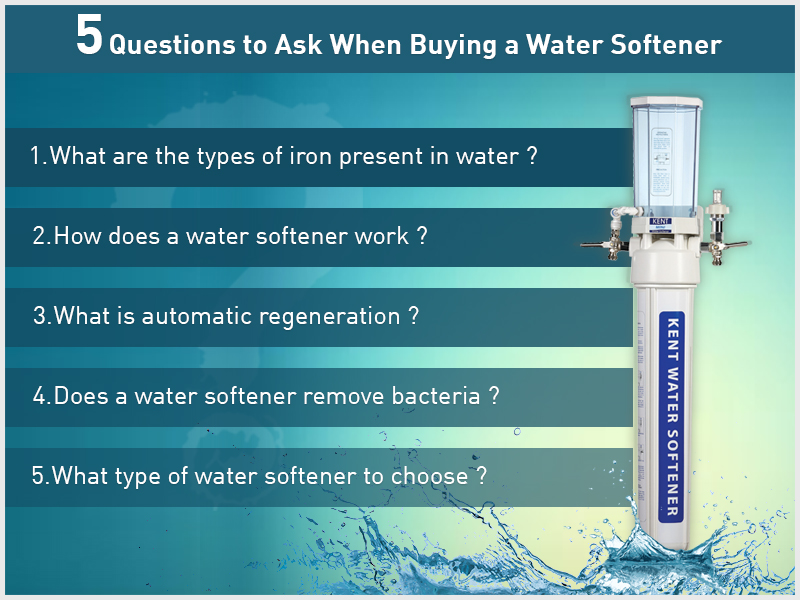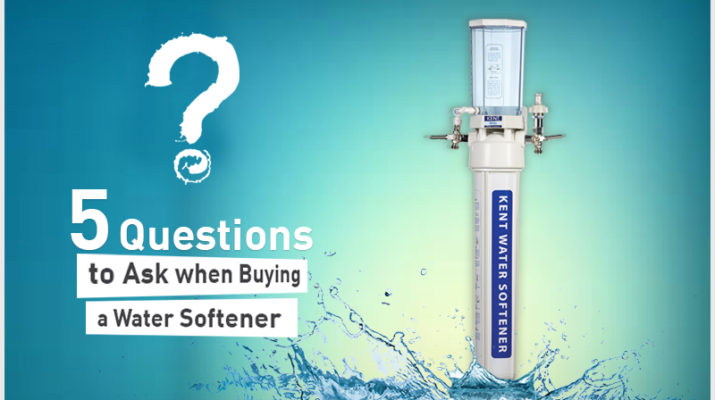Hard water is one of the common problems that many home owners face, especially in India. The presence of excess minerals such as calcium, magnesium, manganese and carbonate make water hard and unfit for usage. Hard water leaves spots on your utensils, causes plumbing problems and also makes your kitchen appliances ineffective. Apart from these, hard water can have an effect on your health and also make your skin and hair dry. Gone are the days when people depended on traditional methods of making hard water soft. With the availability of water softeners for home, you can easily make hard water soft without any extra efforts. However, choosing the best water softener for your home can be a tough task, considering the number of options available in the market. To help you out, we discuss 5 important questions to ask when buying a water softener.

Table of Contents
1. What are the types of iron present in water?
• Water mainly consists of four different types of iron: Oxidized, soluble, colloidal and bacterial iron. Oxidized iron is clearly visible in water. If the water that you receive has red particles, water has oxidized iron.
• Soluble irons form when water comes in contact with air. Soluble iron is also red in color and you can clearly see it present in water.
• Colloidal iron contains tiny particles of oxidized iron, which makes the water look milky. Colloidal iron is small in size and so you can’t remove it with a filter. Water that has colloidal iron needs chlorination
• Bacterial iron forms in the pipes of the houses and is difficult to remove. If the surface of your crockery or toilet has a reddish-green slime, water has bacterial iron.
2. How does a water softener work?
The main function of a domestic water softener is to treat water and remove the excess minerals that cause hardness. The water softeners use an ion exchange process to remove the hardness and make it suitable for consumption. Water softeners contain resin beads, which remove calcium and other minerals that make water hard with an ion exchange process. The beads in the water softener system remove unwanted elements from water to make it soft. The negative ions of the beads attract the dissolved particles present that make water hard to provide you with soft water. When suspended particles fill up the resin beads , the machine automatically regenerates to continue with the process.
3. What is Automatic Regeneration?
When the water softener operates, the particles that make water hard build up in the resin bed of the softener. After a certain level of build-up, the water softener automatically mixes salt in the water tank to remove the particles from the resin bed. The water softener flushes the tank in order to be ready to start softening the water again. The regeneration process happens generally at night when the machine doesn’t use water.
You can also read: Effects of Hard Water and How Water Filtration Should be Done
4. Does a Water Softener Remove Bacteria?
No. Many people confuse water softener with a purifier and end up buying the wrong product. Both the products can’t be used interchangeably. A water softener is mainly used for treating the hardness in water. To remove bacteria or any other pathogens present in water, you need to get a water purifier. The kind of water purifier that you will need depends on the quality of water. As a result, test the water quality tested before making the final decision.
5. What type of water softener to choose?
Another important question that you need to ask which type water softener should you choose. It is advisable to consider your usage before buying a water softener. Decide whether you need to use the water softener for whole house or just for bathing and washing purposes. For instance, KENT Mini, a top quality water softener is ideal for washing machines, dishwashers and geysers, whereas KENT Autosoft is ideal for complete water supply to your home.
Also Read: Five Reasons To Own A Water Purifier
Last Few Words
Those were the 5 most important questions you need to ask when buying a water softener for home. Before making the final, compare the different options available in the market. Don’t forget to read the customer reviews and the reputation of the company before making the final decision.


I appreciate your 5 top questions to ask about water softeners. My husband and I noticed that we have a lot more hard water lately and need a new water softener. That is interesting that a water softener doesn’t remove bacteria, but it makes sense because it’s for the hardness of water, not bacteria.
My TDS level is 750. I am having a Dr aquaguard Magna UV. i am planning to take a water softner. Will it work to reduce the hardness of water as well as the bacteria.
Hi Niranjan,
First of all, please let us know whether your water purifier has RO technology or just UV. UV water purifiers can remove bacteria, viruses and suspended impurities in water but doesnt remove dissolved impurities. RO water purifiers, however, can remove all kinds of impurities in water including dissolved impurities. As the TDS level of the water you receive is quite high, it is advisable to go for an RO water purifier.
There is a lot of difference between water softeners and water purifiers. Water softeners mainly reduce hardness in water but can’t remove bacteria. The water that you get from a water softener is not suitable for drinking. If you have any other questions in mind, please feel free to ask.
Thank you for your article about water softeners. I like how you explained how a water softener works. It’s interesting to know that water softeners use ion exchange process to remove minerals from the water. It’s also good to remember that even though it helps in softening hard water, water softeners don’t help in eliminating bacteria. I guess I should ask a professional if I want to know more about water softeners.
I appreciate you helping me learn more about water softener and how it works. One thing that I thought was pretty interesting was that you said how water softeners use an ion exchange process to remove the hardness and make it suitable for consumption. Ever since I was little, I have loved to go to my grandmother’s home because they have the softest water. Now being a father, I want my kids to have that some pleasure of enjoying the soft water. Thanks again!
It really is important for people to realize that there is a difference between water softeners and purifiers. Both are essential to good, clean water, but they are not interchangeable. As the article points out, the softener deals with the water’s hardness while the purifier removes any bacteria.
Thanks for mentioning that a water conditioning system does not remove bacteria. It is important to remember that understanding all that a water softener does can help you find the best one for your needs. We are planning on getting a new water softener, so I’m glad I found your page.
I was not sure what softeners are used for, now I know that they soften hardness in water. My mother lives in an area that has lots of calcium deposits in sinks. I think that a water softener would be great for her so that there is no residue on her kitchen faucet.
I never knew how they pulled the minerals out of the water! That is so cool how they work! I will have to tell my little nephew about this. He goes nuts for science stuff.
I really like what you said about how you should look for in a water softener that softens hard water. I also like how you said that you should choose one that works for all of your appliances. My husband and I are looking into a water softening service thanks for your post.
Highly descriptive post, I enjoyed that bit. Will there be a part 2?
I didn’t realize you could localize the water softener to certain uses–I thought it would have to be for the entire house if you had one installed. It’s really good to know you can get certain softeners just for washing and bathing purposes. This makes it sound very affordable, so I’ll have to look into this to see if I can get one installed in my home!